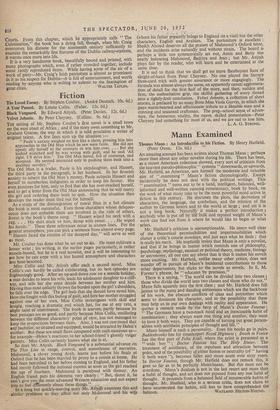Fiction
THE setting of Mr. Stephen Coulter's first novel is a small town on the west coast of Africa ; and if the story owes something to Mr. Graham Greene, the way in which it is told proclaims a writer of original talent. A few lines sum up the situation :— " Paule's anxiety weighed on him like a claim, pressing him into approaches to the Old Man which he saw were futile. She did not openly ally herself to the attempts to win him over. . . . But she looked wretched and he was wrung with guilt, and he said 'All right, l'll drive him.' The Old Man leered, full of contempt, and accepted. He seemed interested only in pushing them both into a shabbier servility."
The Old Man is a trader, Paule is his stepdaughter, and Hassett, the third party in the paragraph, is her husband. In her feverish anxiety to inherit the Old Man's money, Paule subjects Hassett and herself to numberless indignities in order to keep his favour. She even procures for him, only to find that she has over-reached herself, and to get a letter from the Old Man announcing that he will marry the girl and ordering them both to quit. How the situation then develops the reader must find out for himself'.
As a study of the disintegration of moral fibre in a hot climate the book is most successful. Even those characters whose deliques- cence does not enfeeble them are involved in the ruin of others. Sweat is the book's theme song. " Bassett wiped his neck with a rag. . . . His shirt stuck to him, damp with sweat. . . . He wiped his hands." These three references occur in sixteen lines. For the general atmosphere, you can pick a sentence from almost every page. • Hassett faced the routine of the decayed day," will serve as well as most.
Mr. Coulter has done what he set out to do. He must cultivate a looser wrist ; his writing, in the earlier pages particularly, is rather muscle-bound, but he is a real novelist, and it will be interesting to see how he can cope with a less humid atmosphere and characters less heat-besotted.
Miss Collis and Mr. Atiyah offer each a second novel. Miss Collis's can hardly be called exhilarating, but its best episodes are frighteningly good. After an up-and-down row on a seaside holiday, a man decides to leave his wife, leads his adolescent daughter to a cliff- top, and tells her she must decide between her mother and him. Having thus most unfairly thrown the burden upon the girl's shoulders, he falls over the edge. The girl feels that she should have saved him. How she fought with this feeling of guilt, and how her mother struggled against one of her own, Miss Collis investigates with skill and insight, reaching a dramatic end which has, for me at any rate, a slight taint of contrivance. The book is uneven, partly because its best passages are so good, and partly because Miss Collis, oscillating between the different characters' point of view, has not managed to keep the proportions between them. Also, I was not convinced that any bachelor, so situated and equipped, would be attracted by Helen's mother. But these are small flaws compared with such successes as— for example—Helen's reactions to her school-friend's glossily vulgar parents. Miss Collis certainly knows what she is at. So does Mr. Atiyah. Black Vanguard is a substantial advance on The Thin Line in range, control, and smoothness of narrative. Mahmond, a clever young Arab, learns just before his finals at Oxford that he has been married by proxy to a cousin at home. He had been betrothed to her before coming to England, and his father had merely followed the national custom as soon as the girl reached the age of fourteen. Mahmond is paralysed with dismay. An English friend puts his dilemma very clearly : " But, damn it, he can't give you the most advanced Western education and not expect you to feel differently about these things."
In a long but quickly-moving story Mr. Atiyah examines this and similar problems as they affect not only Mahmond and his wife (whom his father presently brings to England on a visit) but the other characters, English and Arabian. The portraiture is excellent : Sheikh Ahmed deserves all the praises of Mahmond's Oxford tutor, and the incidents arise naturally and without strain. The board is perhaps a little too symmetrically set out, Amin and Betty too neatly balancing Mahmond, Badriya and Jean ; but Mr. Atiyah plays fair by the reader, who will learn and be entertained at the same time.
It is sad to think that we shall get no more flamboyant feats of sleight-of-hand from Peter Cheyney. No one played the literary three-card trick with greater assurance or more engagingly. The formula was almost always the same, an apparently casual agglomera- tion of detail for the first half of the story, and then, sudden and firm, the authoritative grip, the skilful gathering of every thread into a tightly-knit conclusion. Velvet Johnnie, a collection of short stories, is prefaced by an essay from Miss Viola Garvin, in which she pays warm-hearted and affectionate tribute to a likeable man and a cunning and seasoned craftsman. The prep.-school sense of adven- ture, the boisterous vitality, the suave, skilled presentation—Peter Cheyney had something for most of us, and we are sad to lose him.
L. A. G. STRONG.


















































 Previous page
Previous page